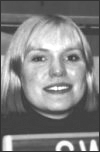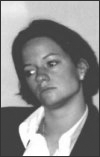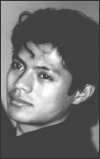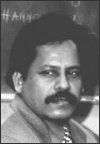Meet the youth delegates to the 55th Session of the General Assembly – October 2000
Participation in decision-making is one of the key priority areas of the UN’s agenda on youth. This, of course, should also be applied to its own work. Therefore, for some years, the most direct form of youth participation at the UN has been the inclusion of youth representatives in some of the the official delegation to the General Assembly of the UN in New York.
For the 55th session of the United Nations General Assembly, eight countries included youth in their delegations. The representatives were at the General Assembly for at least two weeks to raise attention to youth related problems. The youth delegates were in New York from the mid-September until the first half of November 2000. The role of a youth representative varies between member state delegations. Most youth representatives were responsible for delivering a statement to “the Third Committee.” The Third Committee is the part of the General Assembly that deals exclusively with economic and social affairs.
Six youth representatives addressed the Third Committee under item 103 of the General Assembly’s agenda on social development. All representatives also attended a number of meetings within the UN, and assisted their delegations in their consideration of agenda items relating to youth. During several weeks in New York, most had time to fulfill a mixture of roles, being both trainees, politicians, diplomats and lobbyists. This year, they also published their own bulletin and organized a well-attended Youth Symposium at the UN.
All these activities were aimed at raising awareness about the importance of having youth representatives and encouraged other States to include Youth Representatives in their delegations, as well as about the importance of youth participation in general. Several meetings between the Youth Unit and the Youth Representatives took place. The Youth Delegates bring the knowledge home to tell youth in schools and youth-organizations on how UN deals with youth issues.
We interviewed seven of the delegates. Here is what they had to say.
 Marlou Pijnappel, 22, the Netherlands
Marlou Pijnappel, 22, the Netherlands
Marlou is an international business communication and development student at the University in Nijmegen, the Netherlands.
How did you get selected to come here?
The selection process for the Dutch Youth Delegate was advertised in the national newspapers and the magazine. The Canditates were expected to write a short essay on ”what the UN can do for young children” and “what would you like to tell the diplomats at the UN”. Then they made shortlisting and the oral round followed.
What was your role here?
My role in the United Nations General Assembly was to serve as a member of the delegation, and people working for the mission asked me for advice on resolutions and other youth issues. I helped out with the Dutch Honour Crimes Resolution. They were all very helpful and I set my own programme. I also gave a speech to the Third Committee Meeting under item 103. I have attended many meetings with the other Youth Representatives, and together we have built a team and stood for the youth issues.
Did you feel the Third Committee Meeting was effective?
Sometimes I find the Third Committee Meetings a bit boring, but the dialogue and the consensus aim between countries is very noble and at least every country can say what they want to say. I am impressed by the work of the UN as a multinational organization. When you read the papers at home, it seems as if nothing happens, but then when you are here you can see that a lot of discussions are taking place. I think that the Youth Unit can co-ordinate the youth activities within the UN Agencies and be a perfect linking point for National Youth Councils. There should be one body where you could get information. For example: how to build a National Youth Council, but it is important to remember that there isn’t one perfect way to do it. What works in the developed world, does not necessarily work for the developing world. The Declaration of the Rights of the Child and to a lesser extent also the Braga Youth Action Plan could contribute for a better world for children and young people, because they set standards where governments can be looked upon. I feel that the position of young people in many countries, is not regarded as important enough to include them as special representatives to the United Nations General Assembly. I hope that the Youth Representatives taught the delegates that young people can be supportive and useful to their delegation and that it is also very advantageous when they include a young person. Young people are less stuck in diplomat rythmes and more open-minded. Yet the Youth Representatives themselves formed a mini-UN, with own ideas, conflicts and different priorities.
What will you take home from the meeting?
My experience in the United Nations General Assembly resulted in a small fire in myself, to ensure democracy: a strong National Youth Council, a strong network of National Youth Councils and active youth NGO’s in the field. There is a need for more consultation of the member-organizations and promote the UN and it’s unique position in global politics. I have learned how to be more diplomatic in my approach to people and to be a good listener. The first impression may not always be correct. Back in the Netherlands I will work to improve the selection process for the next Youth Representative and also for the Child Summit. It’s important to prepare the Youth Representative well, and link her or him to appropriate activities in the UN and the Mission. I will also speak about the roles of the Youth Representatives during our stay in the Missions, not only to the next Youth Representative and the organizations, but also when I visit highschools. Specific programmes concerning young people, for example on the International Youth Day 12 August and the needs of young people in the world, need to be promoted to young people in Holland.
What do you think about the upcoming World Youth Forum in August?
The next World Youth Forum should be a unique way of exchanging information and create a network that will connect people and a forum to exchange ideas. I hope at least two delegates from each country can attend, and that the outcome document will be an implementation of the Braga Youth Action Plan, which will be acknowledged by the General Assembly next year. I expect the forum to be as democratic as possible.
 Carrie McDougall 22, Australia
Carrie McDougall 22, Australia
Carrie is an Arts and Law student at the University of Tasmania, in Australia. She has completed the BA and Honours sections of the course and is now completing the law component. She is also a member of the United Nations Youth Association of Australia. UNYA is a national youth organization and one of the peak youth bodies in Australia (there is no national umbrella body in Australia).
How did you come here?
I have been interested in the UN for as long as I can remember. I was chosen by my school to attend a state conference run by the Tasmanian branch of the United Nations Youth Association of Australia. From there I was selected as a delegate to attend the National United Nations Youth Conference. Throughout my last years in UNYA I have been involved in a wide variety of projects. The Executive (minus any applicants) of the United Nations Youth Association of Australia is responsible for selecting the Youth Representative for the approval of the Department of Foreign Affairs and Trade. Next year, we hope to include additional prominent youth on the Selection Committee. The position is open to any Australian citizen aged between 15-24 and this position is advertised widely. Emphasis is placed on a candidate’s knowledge of the UN and international issues, experience in working in the NGO field, particularly in youth advocacy, and personal skills.
What are the aims of your organization?
In practical terms the UNYA runs a range of community workshops; regional, state and national conferences for secondary students; runs education packages in schools at primary, secondary and tertiary levels; authors policy platforms on a range of domestic and international issues; lobbies government regarding their own policies; sit on a number of governmental bodies; and represents youth on a range of community, NGO, governmental and international forums.
What was your role here?
I am an accredited member of the Australian Delegation. The Youth Representative has an approximately eight week stay in the Australian Mission, working under the supervision of their First Secretary of the Third Committee. While in New York, the Youth Representative is responsible for the drafting and delivery of a statement concerning issues affecting youth in the Third Committee. My statement focused on the importance of youth participation and means to enhance this in the international arena. I have an intensive programme of meetings with other Youth Representatives. Together, we have met with a large number of UN staff from different Departments and Agencies to discuss youth programmes and strategies to increase youth participation. I also provide youth opinion on some of the resolutions (mostly within Third Committee) which have a particular impact on youth. I am responsible for following debate during the Millennium Summit and during the general debate in the Plenary, as well as in the Third Committee, and providing reports, attending informal negotiations and functions on behalf of Australia and generally providing support, particularly to our other staff members responsible for the Third Committee.
What did you feel about the Third Committee meeting?
I feel the meetings in the Third Committee were effective. The old adage is true – if there wasn’t a United Nations, States would have to invent it. There are obvious frustrations involved in tackling such major issues from so many different perspectives, as well as dealing with the UN bureaucracy. Nevertheless, if you really listen to what people are saying in their statements, you can pick up an enormous amount of information. Informal negotiations which are sometimes frustrating are also amazing when you consider the differences that exist between the people in the room who, on the whole, are working together to come up with a strong resolution. In general, the dialogue between States is so immensely important. It is difficult to comprehend a world without the United Nations.
I also feel that the meetings held by the Youth Representatives were productive and valuable. I think we have raised others’ awareness of the need for youth participation and hopefully made some input regarding policy content, at least within their own delegations. I also think we have provided some new ideas for different UN programmes. Hopefully our publication of our work will also have convinced other States of the importance of including Youth Representatives in their delegations and they will see more Youth Representatives at 56 th UNGA. As all the Youth Representatives have stressed during their time in New York, solutions to problems that particularly affect young people may only be effectively addressed if young people are themselves made part of the solution-finding process. If the UN and its Member States incorporate young people in meaningful ways and listen to their views, they would all be able to learn a great deal from youth.
What have you taken from your stay here?
I have learned a great deal during my stay in New York. I feel that the value of seeing everything work in person is irreplaceable. I have learned a lot about international diplomacy and the realities of working at the UN. I have come up with an absolute plethora of new ideas for projects that my organization can take on back in Australia, and hopefully we will be able to make an even greater contribution to educating members of the Australian community about the UN and in the field of youth advocacy. I also hope that the value of my time here was a two way process and that the Australian Mission benefited from a youth perspective, and that other Member States will think the exercise is a valuable one and include Youth Representatives in future delegations to UNGA. Hopefully the Youth Unit and other UN bodies they met with also benefited from the Australian take on things.
What will you implement in your home country?
When I am back in Australia I will write a comprehensive report for the Australian Department of Foreign Affairs and Trade. In addition I will have a debriefing with Canberra and hopefully make suggestions which will make the position even better for next year’s Representative. I will also share my experiences at a number of UNYA meetings around the country, including at the next National United Nations Youth Conference, in Sydney 2001. I will speak to as many community, school and university groups as possible.
What do you think about the upcoming World Youth Forum in August?
I think that any opportunity for hundreds of young people from all around the world to get together and share their ideas and foster new enthusiasm and demonstrate to the world community the creative solutions that young people can engender is supremely valuable. As a participant at the last World Youth Forum in Braga, I think the next World Youth Forum in Senegal presents a remarkable opportunity to take steps towards implementing the valuable ideas that are contained in the Braga Youth Action Plan. Obviously there are many problems involved with the organization of the Forum and the exact format it will take. Hopefully, however, the Youth Unit will take the suggestions of the Youth Representatives on board and help find solutions to these problems.
The Braga Youth Action Plan is a strong document full of concrete suggestions for increasing youth participation and addressing many of the solutions to some of the key problems that particularly affect youth. What is lacking is a detailed guide on how to implement these ideas. I would like to see the participants in Senegal work on the follow-up to Braga and address these issues, by developing action plans for the implementation of the Action Plan and the formulation of specific projects that could be undertaken at the international, regional, national and grassroots levels.
 Espen Ophaug, 27, Norway
Espen Ophaug, 27, Norway
Espen is studying for a MA in cultural anthropology and is a member of the Young Liberals of Norway (YLN), which is member of the Norwegian Youth Council (LNU).
What is your background?
My first contact with the YLN was in 1994. Beeing interested in politics for a long time I decided to join a political party in 1994. I studied some party-programmes, and found out that the Liberal Party was the right choice. I joined the National Board in 1997, and I have served as second and first Vice President. I am currently International Officer of Young Liberals of Norway. My first contact with the Norwegian Youth Council was some years ago when I was in charge of a democracy-project funded by the YLN. Beeing a member of a committee in the NYC I have been working with the UN and other global youth issues for the last year. The Youth Council in Norway is in charge of electing the Youth Representatives. Every member organization can nominate a person to the Youth Council, which decides according to some criterias. The NYC sends two Youth Representatives to the United nations General Assembly every year, one from the political youth organizations and the other one from the other member organizations. This election-system has worked for nearly 30 years. The Youth Representatives are responsible for the Norwegian statement on youth issues in the Third Committee. I delivered the speech and I also followed the youth debate during the meetings. I was free to follow meetings and seminars I found interesting within the UN-system.
Did you feel the Third Committee meeting was effective?
I didn’t get the impression that the Third Committee meetings were very effective. These kinds of meetings are of course important, but the real discussions seem to take place in informal meetings and in the corridors. I think it is vital that the UN deals with youth issues, and it is very important for the UN to include young persons. The work that the UN does both with poverty reduction and peace-building, the core issues in the UN, must include the young people of the world if it is going to be effective. It is also important for everybody that works with youth issues outside the UN to know that their work is taken seriously by the UN. Bringing in new ways of thinking and working, young people often have a different perspective. Even though I think it is important that young people are being heard, I don’t feel that the UN can learn so much from young people.
What will you take home from your stay here?
I have learned very much about what the UN and the affiliated organizations do in the field of youth issues. I am surprised to see so much work on youth issues being done. I will certainly use this new knowledge in my work as an international officer of the Young Liberals of Norway, and the UN experience will help me a lot with my assignments for the Youth Council. It is expected that the Youth Representatives take an active part in the international work of the Youth Council until it is time for the next Youth Representatives to go to the UN. We will use their experience to prepare coming Youth Representatives, and we will use our knowledge to influence politicians and members of NGOs to get more engaged concerning youth issues.
What do you think about the upcoming World Youth Forum?
I think it is important to hold editions of the Forum on a regular basis. Such a forum will draw attention to youth questions, and it will be impossible for politicians around the world to ignore such an event. The next forum must critically evaluate the Braga Youth Action Plan, and try to find ways of implementing the questions raised in the plan. I don’t think that one should try to broaden the scope of the plan, but rather concentrate on seeking new ways of implementing it.
 Hanna Radberg, 25, Sweden
Hanna Radberg, 25, Sweden
Hanna studies International Political Science at the University of Vaxjo in Sweden, and is member of two organizations: Swedish Ecodemics which is a network for environmental organizations at the Universities of Sweden and Intercultural Youth Culture Exchange (ICYE) that works with youth exchange programmes.
How did you come to the UN?
I have been working with environmental and development issues for the last six years. This year the Swedish Ecodemics are very active in the Haag-negotiations on climate and the CSD-process. (The preparations of the Earth Summit, Rio + 10). I am also involved in the youth-work of UNEP, and I worked as the youth co-ordinator for UNEP´s project “GEO -for -Youth” during 1998 when I was an intern at Peace Child International in UK. I was selected by the National Council of Swedish Youth Organizations (LSU), which is an umbrella organization for 94 youth organizations. LSU is a strong and democratic platform with the aim of providing the member organizations with knowledge and expertise that can strengthen the organizations. All LSU activities originate from a youth perspective. LSU aims to create better conditions for youth organizations to influence their own situation. It also has different committees and I am engaged in the United Nations-committee.
What was your role here?
This year was the second time in succession that Sweden included a Youth Representative in the delegation. My role was to learn as much as possible and bring the information back to the member-organizations of LSU and to create channels of information and contacts that LSU can use in its work. I will stay in New York for two weeks. In a comparison to the other youth delegates I feel that two weeks is too short. The Swedish ministry of foreign affairs didn’t give me any specific mandate and it is sad that the ministry does not view the youth delegate as a stand by. I would have liked to stay as long as the other youth-representatives stay and to have specific tasks given. I hope that the ministry will improve the programme for next year.I followed the discussions in the Second and Third Committee, mainly about the Earth Summit, the Special Session on Children and the Convention of the Right of the Child. I have also followed the Swedish diplomats to various interesting meetings. In addition I have, together with the other Youth Representatives, met a number of UN staff from different Departments and Agencies to discuss youth programmes and strategies to enhance youth participation.
What can the United Nations learn from the Youth Representatives?
I think that only the fact that, ten Youth Representatives have been at UN’s Headquarters have raised others’ awareness of the need of youth participation. Hopefully the publicity of our work has convinced other countries to improve their youth participation. I also hope that we have provided some new ideas for the UN programmes. I feel that I have made progress in my attempt to improve the co-operation between LSU and the Swedish Mission. This was very important for me as I think that the best place to make changes and to create an impact is back home. In the future I wish that the government of Sweden can give financial support to the countries in the South so that they can include Youth Representatives in their delegations.
What have you taken from your time here, and what will you implement in your home country?
I have learned a lot about the work of the UN. I think that one can learn a lot by co-operating and working with people coming from different parts of the world with different traditions, ideas and views on issues. For me it has been two very fruitful weeks. I have learned about UN diplomacy and the realities of working at the UN and I have also realised that there are political influences behind most utterances. I am very pleased with the contact that I have established with the other Youth Representatives and the Swedish Mission and I think that the Mission also benefited from my views and ideas. Concerning the follow-up LSU has given me a mandate period for 1 ½ years when I will be the resource person on UN and international issues. I am going to share my experience with the member-organizations of LSU. I will organise speeches, workshops and slide-shows for the youth-organizations. I will also write articles in youth-magazines and in newspapers with the aim of inspiring other young people to work with international issues. I plan to continue my work in the UN committee within LSU, and help the next year Youth Representative in her/his preparations. In addition I will write a report, to be sent to the Ministry and to be circulated to everyone interested. LSU will continue their dialogue with the Ministry to improve the youth participation in international conferences both for Swedes and for young people in poor countries. In my own NGO, Swedish Ecodemics I have an important task to work towards the Earth Summit, Rio+10, to mobilize young people and provide them with information so they can take an active part in the process.
 Hege Yli Melhus, 26, Norway
Hege Yli Melhus, 26, Norway
Hege was the president of the Association of Norwegian Students Abroad. She studied in France for six years. She was nominated by the Norwegian Youth Council to be a youth delegate. The Council nominated one male and one female from one political and one nonpolitical organization. Two people were sent in two week intervals.
What was your role here?
There were three purposes for me being here: to meet with other youth representatives, meetings with other UN representatives, and work on the symposium.
Did you feel the Third Committee meeting was effective?
The third committee was useful. I think that knowledge of the UN system and facilities to follow the meeting would be useful otherwise it would be hard to follow progression or the change over the years. I followed the statements on the advancement of women in the 3rd committee meeting. The UN plays an important role and that the delegates would not be where they were right now if it weren’t for the UN. I praise the Youth Unit for organizing the World Youth Forum and other meetings. . I feel that young people know best about their own situation, and youth in western countries need to work with youth in developing countries. I feel that networking was essential for youth to aid in later attempts for change. I also feel that the UN has a way to go in improving education and looking at children in armed conflict. I also realize that some resolutions have to be watered down because of competing country interests.
What will you take home from the meeting?
I think that it will be easier to work within UN framework now. When I go home I will write an article, brief the National Youth Council as well as the Ministry of Foreign Affairs. I want to show youth that they have power and work on ways of getting funding for poorer countries so that youth representatives from developing countries can attend.
What do you think about the upcoming World Youth Forum in August?
The World Youth Forum is good because it empowers young people. I feel that people can learn from each other without bias to one country.
What can the United Nations learn from the youth of the world?
I feel that UNICEF and other organizations already appreciated the fact that children speak from the heart. I feel that by letting youth become a more visible part of the UN, more frank discussion will take place. I think it is important to listen to youth because young people know best about the issues affecting them.
 Bremley Lyngdoh, 25, India
Bremley Lyngdoh, 25, India
Bremley is affiliated with the United Nations Student Association of India. He joined the Indian Federation of UN Associations when he was 13. It raised money for disability and other causes while he was still young. In high school he got involved on a state and national level by joining the Indian Federation. The Federation represents 20 of the 25 states. The Federation is part of the World Federation where all member states have equal status. Bremley is also active in a large number of youth service organizations in the US. He has also been an intern at the United Nations in New York, working in the area of sustainable development.
What was your role here?
I have been following the Second and Third Committee meetings, and like the others, I made a statement in the Third Committee. I feel that the meetings were effective. At the conclusion, many delegates asked for further discussion and there were a lot of networking opportunities for us with the World Bank and ILO. I want to stress that it is just rhetoric until something actually happens. I feel that the UN is getting better at focusing on youth issues but there needs to be follow-up. I am satisfied overall with the reforms and inclusive nature of the UN. I would like to see the member states of the UN work as partners without restriction. We should also make alumni lists of former youth representatives to help new youth delegates network.
What will you implement in your home country?
When I go home I will brief groups on what I observed at the Third Committee meeting and also from my observations and findings they will determine whether India will continue to send delegates or not.
What can the United Nations learn from the youth of the world?
I feel that the UN can learn a lot from young people. For example, during the youth delegates short period of stay here, we were able to work together. Youth have energy and spirit by working across boundaries, young people can share common interests the world over. I also feel that the youth can have a big impact if many countries send youth representatives to the meetings of the General Assembly. I think that it is important to include youth in the UN system. I will stress the importance of getting youth ideas from their elders to benefit from their wisdom.
What do you think about the upcoming World Youth Forum in August?
I see the World Youth Forum as a great platform for UN. I think that it is important for more countries to put money into the Youth Fund so that many people from developing countries can come. There should be sufficient money in the Youth Fund so that more meaningful action can take place. The Forum is a way for countries to see what other countries are doing lest they duplicate each other’s actions and learn from the experiences of others. Also it provides a strong networking opportunity for youth, so that all people have access to information and provides programs for organizations to do. I am glad that the Forum is being held in Senegal so that people from the North get an opportunity to see how people in the South are living. But I also think that ministers of youth affairs need to be an integral part of the system.
 Dulal Biswas, 34, Bangladesh
Dulal Biswas, 34, Bangladesh
Dulal represents the National Federation of Youth Organizations in Bangladesh. He started his work on youth issues in 1978. In 1995, after pressure from NFYOB, the Government of Bangladesh set up a national youth day. In Bangladesh the government considers those people 15-30 as youth. The NFYOB recognizes those 15-35 as youth because of the length of time it takes one to get an education.
What was your role here?
I missed the first week of the Third Committee meetings but arrived on the 1st of October. I made a statement on the international drug trafficking of drugs and how it affects youth. I feel that the meetings that I attended were effective. I feel that the chairperson was especially effective in running the meeting.
What do you feel is the United Nations role on youth issues?
The UN’s role is to organize meetings and discuss the role of youth. I feel that the UN should look at the resolutions proposed in Braga . They should then urge countries to adopt legislation. I also feel that the UN should have requested national governments to have youth representatives in government decision making and sending youth representatives to the General Assembly meetings. Since not all organizations have resources to do this, national government should be requested to assist.
What will you take home from the meetings?
From the Third Committee meetings, I feel that I have gained knowledge and ideas on how to run an international meeting. I have also learned logistical aspects of interpersonal relations.When I return home, I plan to run a national and international meeting on youth policy issues. I will then report on my findings here and send a report to the Ministry of Youth and Sports as well as member organizations.
What can the United Nations learn from the youth of the world?
I feel that the UN should understand that youth all over the world have varying problems. Unless the UN allows their involvement, the General Assembly cannot be informed on the situation of youth. I also feel that youth could generate ideas on how the youth unit can intervene.
What do you think about the upcoming World Youth Forum in August 2001?
The World Youth Forum is valuable because it helps to develop young people’s participation in their own future. I think that the focus of the Forum should be to review the Braga Declaration, evaluate it and update it if necessary. The developing countries should have a greater role. Also, the host country benefits from the experience.
